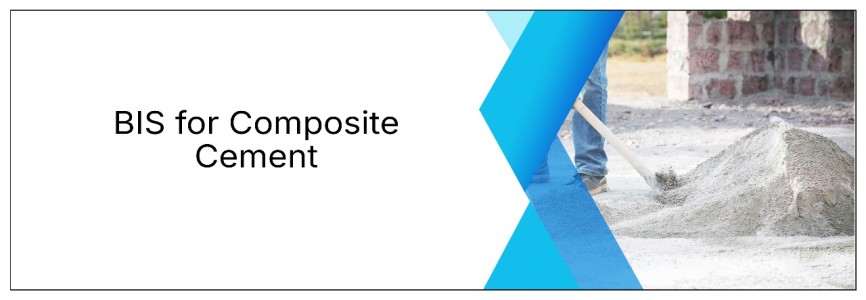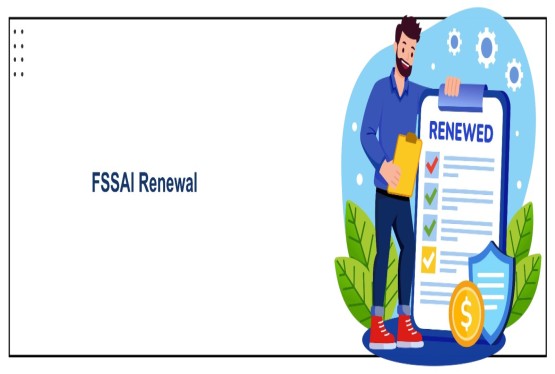In India, the construction industry is one of the largest sectors contributing to the economy. Cement plays an important role in this industry. To ensure safety, strength, and longevity in construction, it is essential to use quality-certified cement. Among the various cement types available in the market, composite cement is gaining popularity due to its superior performance. To regulate the quality of such cement, the Bureau of Indian Standards (BIS) has introduced a specific standard—IS 16415:2015. Manufacturers of composite cement must obtain BIS Certification for Composite Cement to sell their products in the Indian market legally.
What is IS 16415:2015?
IS 16415:2015 is the Indian Standard that governs the specifications for composite cement. This standard outlines the manufacturing, chemical, physical, and packaging requirements of composite cement. It ensures that cement sold in the market adheres to defined quality benchmarks. The composition, strength, and durability of composite cement are thoroughly covered under this standard.
This standard specifies the use of materials such as clinker, fly ash, granulated slag, and gypsum in a specific proportion to manufacture composite cement. The mixture provides high-strength and durable concrete, which is especially useful in large-scale construction projects.
Composition of Composite Cement
Composite cement is a blend of various materials:
-
Clinker: Forms the base material, comprising 35% to 65% of the composition.
-
Fly Ash: A byproduct from thermal power plants, used in proportions of 15% to 35%.
-
Granulated Slag: Derived from steel plants, typically included at 20% to 50%.
-
Gypsum: Added at about 3% to 5% to regulate the setting time of cement.
The blend is achieved through intergrinding or thorough mixing of all materials to ensure uniformity. This combination leads to a high-quality product capable of resisting alkali and sulfate attacks in concrete.
Importance of BIS Certification for Composite Cement
BIS Certification for Composite Cement is essential for several reasons:
-
Quality Assurance: It ensures that the cement meets the chemical and physical properties required by Indian standards.
-
Market Legality: Without BIS certification, a manufacturer cannot legally sell composite cement in the Indian market.
-
Consumer Trust: Certified products are seen as more reliable, boosting consumer confidence.
-
Export Advantages: BIS certification can also help in exporting the product to countries that recognize Indian quality standards.
-
Regulatory Compliance: Using BIS-marked products is often a mandatory requirement in government or large-scale infrastructure projects.
Required Tests for BIS Certification of Composite Cement
To obtain BIS Certification for Composite Cement, manufacturers must conduct several tests in a well-equipped laboratory. These tests are divided into physical and chemical categories:
1) Physical Tests:
-
Fineness: Ensures the cement particles are ground to the right size for optimum strength.
-
Setting Time: Determines the time it takes for cement to begin and complete setting.
-
Soundness Test: Checks the cement's ability to retain its volume after setting.
-
Compressive Strength: Assesses the strength of cement after a specific curing period.
-
Fly Ash Testing: Measures the quality and percentage of fly ash used in the mix.
2) Chemical Tests:
-
Magnesia: Should be within the prescribed limit to prevent cracks.
-
Insoluble Residue: Ensures no excessive impurities are present.
-
Loss of Ignition: Determines the presence of moisture and volatile substances.
All tests must be conducted as per the procedures defined in IS 16415:2015. Test results are important for the BIS certification process.
Packaging and Marking Guidelines
According to IS 16415:2015, each bag or container of composite cement must include the following details:
-
Name and type of cement
-
Net weight
-
Manufacturer’s name and address
-
Batch number and date of manufacture
-
License number and the ISI mark (if certified)
Manufacturers who want to display the ISI mark on their packaging must first obtain the BIS license. The mark reflects the authenticity of the product and confirms that it meets Indian quality standards.
Procedure for BIS Certification for Composite Cement
To obtain BIS Certification for Composite Cement, manufacturers must follow a detailed and systematic process:
-
Application Submission: The manufacturer must submit Form along with the necessary fees to BIS.
-
Document Review: BIS examines the submitted documents, including product details, manufacturing process, and quality control systems.
-
Factory Inspection: BIS officials visit the manufacturing site to inspect the infrastructure and testing facilities.
-
Sample Testing: Product samples are collected and sent to BIS-recognized labs for quality testing.
-
Grant of License: If the product passes all tests and the facility complies with BIS standards, the license is issued.
This license allows the manufacturer to use the ISI mark on their cement bags or containers. It is generally valid for one year and must be renewed after an inspection and review.
Documents Required for BIS Certification for Composite Cement
To apply for BIS Certification for Composite Cement, manufacturers must submit the following documents:
-
Company registration certificate
-
Factory layout and location details
-
Manufacturing process flowchart
-
List of machinery and equipment
-
Quality control plan and testing protocol
-
Test reports from in-house or external laboratories
-
Details of raw materials and their suppliers
-
Applicant’s identity and authorization letter
Providing accurate and complete documents helps avoid delays in the certification process.
Indian Standards for Other Types of Cement
Besides composite cement, BIS has defined standards for various other types of cement:
|
IS Number |
Product Name |
|
IS 1489 (Part 2) |
Portland Pozzolana Cement |
|
IS 16415:2015 |
Composite Cement |
|
IS 455:2015 |
Portland Slag Cement |
|
IS 12600 |
Low Heat Portland Cement |
|
IS 1489 (Part 1):2015 |
Portland Pozzolana Cement |
|
IS 269:2015 |
Ordinary Portland Cement |
|
IS 3466:1988 |
Masonry Cement |
|
IS 6909:1990 |
Supersulphated Cement |
|
IS 8042:2015 |
White Portland Cement |
|
IS 6452:1989 |
High Alumina Cement |
|
IS 8043:1991 |
Hydrophobic Portland Cement |
|
IS 8229:1986 |
Oil Well Cement |
|
IS 15895:2011 |
High Alumina Refractory Cement |
|
IS 16993:2018 |
Microfine Ordinary Portland Cement |
Manufacturers of any of the above cement types must obtain the respective BIS certifications before selling their products.
Role of a Well-Maintained Laboratory
An important requirement for BIS certification is having a well-equipped laboratory. The lab must be capable of conducting all the physical and chemical tests specified in the standard. The lab should have:
-
Calibrated testing machines
-
Qualified and trained technical staff
-
Defined testing procedures and documentation
-
Quality records and test reports
Having such a laboratory ensures consistency in product quality and helps in internal quality control even before BIS inspection.
Conclusion
BIS Certification for Composite Cement under IS 16415:2015 is not just a regulatory requirement but a mark of trust and quality. It demonstrates a manufacturer’s commitment to quality, safety, and compliance with Indian standards. From composition and testing to packaging and documentation, every step must be followed meticulously to obtain and retain the BIS license.
This certification not only enhances credibility in the Indian market but also opens the door to government and large infrastructure projects. For manufacturers looking to establish or expand their presence in the cement industry, BIS certification is a necessary and valuable step.
If you need any assistance in BIS Certification, then you can book a consultation with our experts through email info@ccoffice.in or Call/Whatsapp at +91 9988424211.
FAQs
Q1. What is BIS Certification for Composite Cement and why is it important?
Ans. BIS Certification for Composite Cement is a mark of quality and compliance with the Indian Standard IS 16415:2015. It is issued by the Bureau of Indian Standards (BIS) and ensures that the cement meets specified chemical, physical, and manufacturing criteria. This certification is important because it allows legal sale in India, builds consumer trust, and is often mandatory for government and infrastructure projects.
Q2. Which materials are used in the manufacturing of composite cement as per IS 16415:2015?
Ans. Composite cement is made by intergrinding or blending Portland cement clinker (35–65%), fly ash (15–35%), granulated slag (20–50%), and gypsum (3–5%). These proportions are designed to produce durable, high-strength cement that meets the physical and chemical specifications laid out in the standard.
Q3. What are the key tests required for BIS Certification of Composite Cement?
Ans. To qualify for BIS Certification, the cement must pass several physical and chemical tests. Physical tests include fineness, setting time, soundness, compressive strength, and fly ash testing. Chemical tests include limits on magnesia, insoluble residue, and loss on ignition. All tests must follow procedures specified in IS 16415:2015.
Q4. Who can apply for BIS Certification for Composite Cement?
Ans. Any manufacturer of composite cement, whether based in India or abroad, can apply for BIS Certification. Indian manufacturers must follow the domestic manufacturer certification process, while foreign manufacturers must follow the foreign manufacturer certification scheme (FMCS) governed by BIS.
Q5. What documents are required to apply for BIS Certification for Composite Cement?
Ans. Key documents include the factory license, layout plan, list of manufacturing and testing equipment, process flow diagram, quality control plan, raw material details, in-house or third-party test reports, and proof of business registration. These documents help BIS verify the production and quality standards.
Q6. How long is the BIS license valid, and does it need to be renewed?
Ans. The BIS license is typically valid for one year and must be renewed annually. Renewal involves inspection, review of production quality, and compliance with the standard. If the manufacturer continues to meet the BIS requirements, the license is extended.
Q7. Can a manufacturer use the ISI mark without obtaining BIS certification?
Ans. No, the ISI mark can only be used after obtaining a valid BIS license. Unauthorized use of the ISI mark is a punishable offense under the BIS Act. Only certified manufacturers are allowed to print the ISI mark on cement bags or containers to indicate conformity with IS 16415:2015.








_crop10_thumb.jpg)


















































































_for_FY_2025-26_crop10_thumb.jpg)












_learn_crop10_thumb.jpg)








_Filing_Due_Dates_for_FY_2024-25_learn_crop10_thumb.jpeg)






































_of_GST_Act_learn_crop10_thumb.jpg)










_Under_GST_learn_crop10_thumb.jpg)









_crop10_thumb.jpg)


_crop10_thumb.jpg)






_learn_crop10_thumb.jpg)






















_of_the_Income_Tax_Act_learn_crop10_thumb.jpg)



_learn_crop10_thumb.jpg)






_learn_crop10_thumb.jpg)






_crop10_thumb.jpg)




















_in_The_Income_Tax_Act,_1961_learn_crop10_thumb.jpg)



_learn_crop10_thumb.jpg)



_of_the_Income_Tax_Act_learn_crop10_thumb.jpg)


_Of_Income_Tax_Act_learn_crop10_thumb.jpg)








_learn_crop10_thumb.jpg)








_learn_crop10_thumb.jpg)
_crop10_thumb.jpg)






















_learn_crop10_thumb.jpg)
_for_Import_and_Export_learn_crop10_thumb.jpg)




































